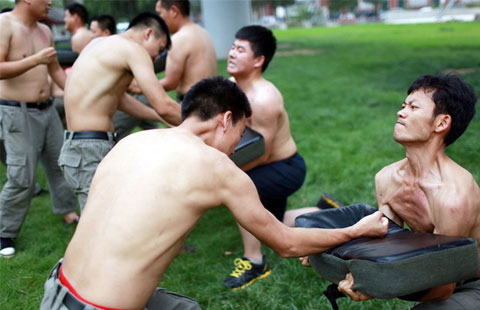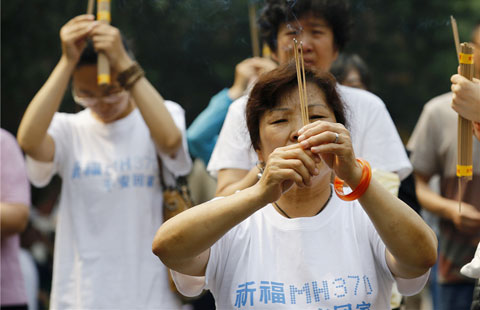

In China, the Chinese Dream stirs hopes and sets expectations; internationally, it provokes questions and elicits concerns. Here I look outside China - exploring attitudes, suggesting responses and warning of the dangers of self-fulfilling prophecies.
President Xi Jinping's overarching vision of the Chinese Dream has become a grand driver of China's continuing reform and development. The Chinese Dream differs from the American Dream in that it expresses China's collective aspirations - "the great rejuvenation of the Chinese nation" (in Xi's words) - and it differs from the Chinese Dream in Chinese history by embracing the personal dreams of individual Chinese people for attaining happy, healthy, abundant and productive lives.
That the entire world derives material benefits from the Chinese Dream is apparent in a global economy. Higher standards of living mean greater consumption of goods and services in China, which works to create jobs and prosperity in a multiplier effect worldwide. China's commitment to science enables all peoples to share in China's success, often by making new technologies widely available at low costs.
Misperceptions, however, can distort motivations. Western anxiety is rooted in the fear that for China to fulfill the Chinese Dream, China will become more assertive, more aggressive and more expansionist in foreign affairs, especially when dealing with smaller neighbors. Even though China's leaders avow "No matter how strong China becomes, China will never seek hegemony", there's still the worry that sometime in the future, newer reasons will emerge to belie the older promises. One never knows, foreigners fret, when the "gentle giant" will have a change of heart, when the "awakened lion" will not be so "peaceful, pleasant and civilized".
In his speech "China's Challenge to American Hegemony", former US ambassador Charles W. Freeman, Jr (the chief interpreter during President Nixon's legendary trip to China in 1972) advises us "to see China as it is, not as we wish or fear it to be" nor as China itself may today sincerely proclaim. He argues: "China is inadvertently echoing the American isolationists of the 19th and early 20th centuries. The United States did not then seek to dominate or control the international state system, nor did it pursue military solutions to problems far from its shores. In time and in reaction to events, however, America came to do both."
Freeman concludes: "The more likely prospect is that China will take its place alongside the US and others at the head of a multilateral system of global governance. In such an oligarchic world order, China will have great prestige but no monopoly on power comparable to that which the US has recently enjoyed."
Li Junru, former vice-president of the Central Party School, said that it is a misunderstanding to worry about China's expansion when the country is seeking rejuvenation. Rather, he said, "we put forward the concept of rejuvenation based on our historical experience that lagging behind leaves one vulnerable to attacks".
"When we talk about the great rejuvenation of the Chinese nation, some people ask me which period in history China wants to return to," Li continued." The Yuan Dynasty (1271-1368) after Genghis Khan's expansion, or the heyday of the Qing Dynasty (1644-1911) before the 1840 Opium War? It is a pure misunderstanding if it is not asked in a malicious way."
What about that danger of "self-fulfilling prophecy"? It cuts both ways. If foreign powers, led by the US, do in fact strategize to "contain China" (artlessly applying George Kennan's classic Cold War narrative of "containing" the Soviet Union), then China will react adversely and confrontation will be made more likely, not less. Similarly, if China robotically interprets all US policies as "containment", and reacts adversely, it could inadvertently make actual containment more likely. It's "Game Theory 101". These political equations can only be solved in parallel, not in series, with 'transparency' being the key operator. China and the US must strive for openness and candor, particularly in matters of defense.
Foreigners are wary of relying on China's goodwill, no matter how genuine. This frustrates China, but China must not cast blame or conjure up conspiracies. Better is to show how China's national interest would be undermined by trying to assert hegemony. China's main mission is to elevate the standard of living of its citizens and international troubles undercut China's capacity to achieve this goal.
Looking back, future historians will likely assess the Chinese Dream as a visionary milestone that energized President Xi's transformation of China across a broad spectrum of complex economic, social and governance issues. The entire world should benefit - though missteps along the way will be easy to make. Vigilance and diligence are not optional.
I conclude with a personal story. Two years ago, to honor the achievements of China's previous leaders, I was asked to co-produce, host and write a TV documentary series. While this may be a worthy project, I suggested that it may not be the best way to tell the real story of China to international audiences. Better, perhaps, might be to explore the problems-the challenges-that China's new leaders face.
Next month, May, China's Challenges is being broadcast on PBS stations across the US ("World" network). Framed in terms of President Xi's Chinese Dream, the five-part TV series addresses social issues (healthcare, education, housing, retirement), economic restructure and pollution, innovation, political reform (such as budgetary transparency), and beliefs (women, religion, national service).
By showing that China is candid about its problems, and confident about presenting them openly, we hope to deepen appreciation for what the Chinese Dream really means - transformative for China and a gift for the world.
The author is an international corporate strategist and investment banker, and the author of the biography of former president Jiang Zemin.
(China Daily 04/17/2014 page8)







